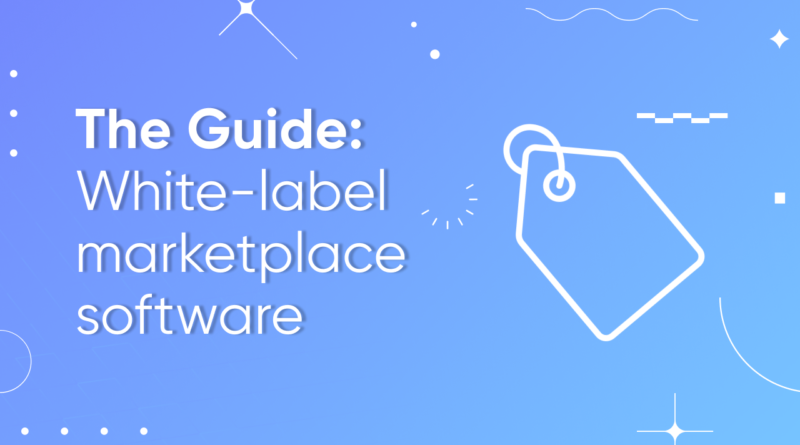White Label Marketplace Software: Easiest Way to Launch an Online Marketplace in 2024
In the fast-paced and ever-evolving digital landscape of 2024, launching an online marketplace has become an enticing prospect for entrepreneurs and businesses looking to expand their online business. However, the path to establishing a successful online marketplace can be daunting, involving complex development, time-consuming strategies, and substantial financial investments.
This is where the concept of a white label marketplace platform comes into play, offering a compelling solution to these challenges. Whether you’re a startup looking to make your mark in the world of marketplaces, an established online business seeking to diversify your offerings, or an established entity aiming to stay ahead of the curve, a white label marketplace platform holds the key to unlocking your online marketplace dreams.
But what exactly is white label software, and why should you invest your time in understanding it? In this article, we’ll delve into the intricacies of white label marketplace software and explore why it stands as the easiest and most cost-effective method for launching a thriving online marketplace in 2024.
By the end of this journey, you’ll not only have a comprehensive understanding of the concept but also the valuable insights needed to make informed decisions for your online business’s growth and success in the digital age. Let’s embark on this exploration of the digital marketplace landscape and discover the immense potential that white label software offers for creating a customized marketplace platform.
Contents
- What is a white label marketplace platform?
- Which types of businesses use white label marketplace platforms?
- What are pros and cons of white label marketplace software for businesses?
- What features should you look for in a white label marketplace platform?
- What are the best white label marketplace platform providers?
- Which to choose for online business: SaaS vs. On-Premises white label marketplace software?
- How much does it cost to create a marketplace with white label marketplace software?
- FAQ
What is a white label marketplace platform?
To truly grasp the power of white label marketplace platforms, it’s essential to break down the concept into simpler terms. At its core, a white label marketplace platform is a ready-made solution that empowers businesses to create and operate their very own online marketplace without having to start from scratch.
Think of it as a “business-in-a-box” for eCommerce marketplaces. Just like how you might customize your smartphone with various mobile apps to tailor it to your needs, businesses can customize these platforms to create a unique and fully operational online marketplace. It’s a game-changer for your marketing strategy, whether you’re a small boutique looking to expand your ecommerce store or a larger enterprise aiming for a broader customer reach.
Here’s a simple example to illustrate this:
Imagine you’re a small boutique owner, and you want to expand your online business by selling your unique handcrafted items. Instead of investing in custom development to build a website or a mobile app from the ground up, you can use a white label marketplace platform. It’s like renting a beautifully designed storefront in a bustling mall. You get to put your own brand’s logo on the front, decorate it according to your style, and stock it with your products, but you don’t have to worry about the complex development of the building itself.

These platforms provide you with the essential tools, such as website design, shopping cart, payment processing, and product listing capabilities. All you need to do is bring your products and branding, and you’re ready to serve customers in your very own online marketplace. It’s like having a powerful marketing strategy at your fingertips, tailored to your unique business needs.
In essence, a white label marketplace platform simplifies the process of entering the online marketplace world, making it accessible to businesses of all sizes, from small boutiques to larger enterprises. It’s a shortcut to creating a customized marketplace that carries the distinctiveness of your own brand and, at the same time, opens up new horizons for your eCommerce business.
Which types of businesses use white label marketplace platforms?
White label B2C and B2B marketplace platforms cater to a wide range of businesses, offering a versatile solution for various industries. Let’s explore some examples of how businesses can harness the potential of a white label marketplace platform to their advantage.
Retailers
For retailers, a white label marketplace platform offers a golden opportunity to diversify their product offerings within their own online marketplace. These platforms enable retailers to consolidate items from various sellers in one location, creating a unified and customized marketplace. Imagine a retailer featuring custom clothing, accessories, and shoes from a myriad of brands and suppliers in a single online marketplace. This approach not only provides customers with a broader selection but also serves as a revenue booster while minimizing inventory expenses.
Manufacturers
Manufacturers can utilize a white label marketplace platform to cut out intermediaries and sell their products directly to consumers. By establishing a marketplace for their own offerings, manufacturers gain greater control over pricing, branding, and customer relationships. This approach empowers manufacturers to connect with their target audience more effectively and maximize their market presence.
Digital Service Providers
Industries like telecommunications can also benefit from a white label marketplace platform. Establishing a marketplace that resells business services from different vendors allows telecommunications companies to attract more customers and explore new revenue streams. By providing a centralized platform for various services, they become a one-stop destination for businesses seeking telecom solutions, a win-win for their online marketplace.
Small Businesses and Entrepreneurs
Brandable eCommerce marketplace solutions, often powered by a white label marketplace platform, are a lifeline for small businesses and entrepreneurs who may lack the resources or budget to build a custom online shop from the ground up. It’s an exceptional opportunity to gain a customized marketplace that not only increases revenue streams but also accelerates innovation. Collaborating with a technology partner who designed the platform enables smaller players to compete effectively in the online marketplace arena and run targeted marketing campaigns to promote their white label marketplace.
Larger Businesses
Larger businesses often turn to eCommerce solutions, leveraging a white label marketplace platform to streamline their online presence. These solutions offer scalability and management advantages without the need for extensive in-house development. Moreover, they provide customization options for branding and appearance, making them a valuable choice for businesses looking to create a distinctive online marketplace presence and launch their own white label platform.
In summary, the versatility of white label marketplace platforms makes them a viable option for a diverse array of businesses. From retailers seeking expansion to manufacturers aiming for direct consumer engagement and even digital service providers looking to broaden their service portfolio, these platforms serve as a gateway to growth and innovation in the online marketplace world.
What are pros and cons of white label marketplace software for businesses?
The advantages of white label marketplace software
- Ongoing Support and Maintenance: Many white label marketplace solutions offer ongoing services to keep the platform up-to-date and running smoothly, relieving businesses of technical burdens and allowing them to focus on growing their online marketplace.
- Rapid Deployment: White label marketplace platforms come pre-built and require minimal setup, allowing companies to swiftly launch their online marketplace. This quick launch is especially valuable for businesses aiming to tap into the dynamic world of online marketplaces and accelerate innovation.
- Cost-Efficiency: Using a white label marketplace to establish an online marketplace is a cost-effective approach for businesses. It eliminates the need to build a custom platform from scratch, saving both time and expenses.
- Tailored Customization: White label marketplace platforms can be customized to match a business’s unique branding, design preferences, and functionality requirements. This ensures seamless alignment with the business’s identity and goals within their multi-vendor marketplace.
- Scalability: These platforms are designed to grow with a business, effortlessly accommodating an expanding roster of sellers and products. They are also flexible enough to adapt to evolving pricing strategies, ensuring scalability and sustainable growth for your online marketplace.
Challenges associated with white label marketplace software
- Control Trade-Off: While convenient, these platforms may limit a business’s control over the platform’s development, updates, and overall direction within their online marketplace.
- Limitations on Flexibility: Some white label marketplace scripts have restrictions when it comes to adding unique features or functionality, potentially limiting the ability to accelerate innovation or implement specialized features.
- Brand Identity Alignment: Pre-built marketplaces often share a similar layout, making it challenging for a platform to stand out from the crowd and fully align with the unique brand identity of the business in their online marketplace.
- Vendor Commitment: Changing platforms after investing can be challenging, potentially leading to vendor commitment issues and difficulties in switching providers within a multi-vendor online marketplace.
In summary, white label marketplace scripts offers a host of benefits, such as cost-effectiveness, quick launch capabilities, scalability, ongoing support, and customization options. However, businesses should carefully consider the limitations, including potential flexibility constraints, limited control over the platform, vendor lock-in concerns, and challenges related to brand differentiation, before deciding if a white label marketplace platform aligns with their specific business needs and goals.
What features should you look for in a white label marketplace platform?
Selecting the right software for your online marketplace is a critical decision. Not all solutions offer the essential features and capabilities necessary for launching and sustaining a successful marketplace. To help you make an informed choice and find the best fit for your business, here are key components to consider when evaluating products in this space:
- Data-Driven Analytics and Reporting: Comprehensive analytics and reporting tools are vital. They provide businesses with detailed insights into customer behavior, sales data, marketing campaigns, and more. This data-driven approach allows businesses to track progress, identify areas of opportunity, and make data-driven decisions that will help them grow their marketplace.
- Efficient User Management: User management is an essential feature for a marketplace eCommerce solution. It should provide direct access for businesses to monitor user accounts, access levels, and account details. This streamlines user organization, ensuring secure and up-to-date accounts while offering insights into user activity for improved user experience optimization.
- Payment Processing: Look for a platform that offers a variety of payment methods and customizable payment experiences. A robust payment system ensures a seamless and convenient payment experience for users, avoiding potential disruptions and issues associated with outdated or unreliable payment systems.
- Robust Marketing and Promotion: Look for a platform with robust marketing and promotion features. This allows you to market your online marketplace and helps users market their own products. The right software should offer tools to create and run targeted promo campaigns based on user data, automate campaigns across multiple platforms, track the success of those campaigns, and more. Access to these tools ensures that customers are always aware of new products and deals, making marketing campaigns more effective.
- Mobile Optimization: Ensure the platform is optimized for mobile use and provides a seamless user experience across multiple devices, including mobile apps, to cater to an ever-growing mobile user base.
- Effective Product Management: Effective product management is a crucial feature. It should enable easy management and monitoring of product listings, pricing, inventory levels, and other key product details. This allows businesses to ensure that their products are accurately represented, especially when they offer their own offerings. Automation of certain aspects of product management also streamlines operations and guarantees that customers have access to the latest products and deals.
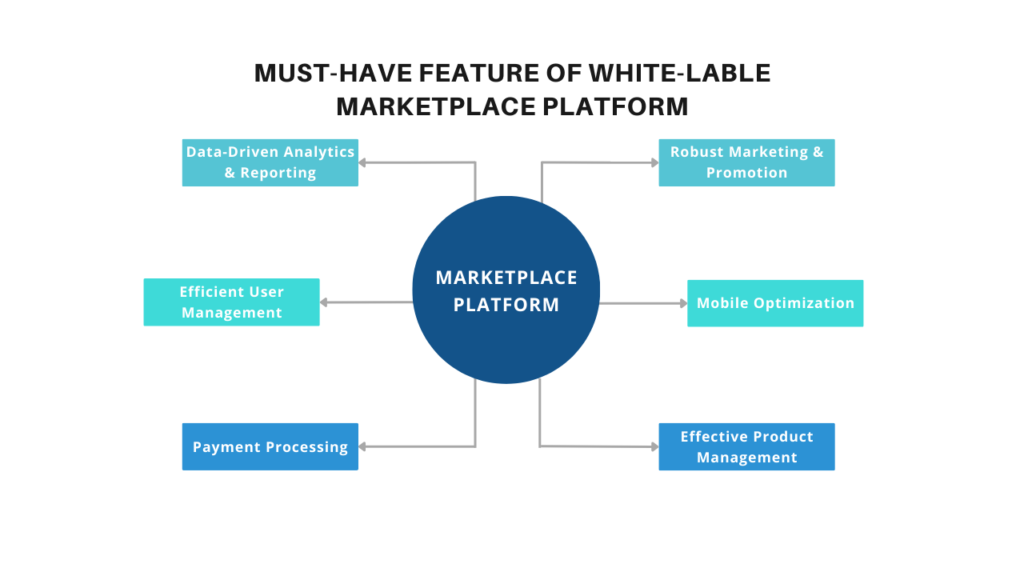
In addition to these features, there are several other essential factors to consider when evaluating a white label marketplace platform:
- Comprehensive Reporting and Analytics: Detailed reporting and analytics help track sales, monitor performance, and make strategic decisions, ensuring you stay competitive. This is essential for effective email marketing campaigns and making informed decisions based on data.
- Tailored Customization: Customization is paramount when choosing a white label marketplace platform. Most of these solutions allow businesses to tailor their platform to their specific needs, target audience goals, and preferences. This ensures that your marketplace offers an experience tailored to your business requirements, helping with customer outreach, retention, and loyalty.
- Integration Capabilities: Ensure the platform seamlessly integrates with your other business tools, such as email marketing tools and accounting software, to streamline operations and enhance efficiency in your own brand marketplace solution. This is especially crucial in marketplace development to ensure everything functions smoothly.
- Security Measures: Prioritize robust security features to safeguard customer data and maintain trust in your marketplace.
- Scalability: Look for a platform that grows with your business, easily accommodating more sellers and multiple sellers, while offering custom development solutions to add more profit margin.
What are the best white label marketplace platform providers?
Selecting the right white label marketplace software
Choosing the ideal marketplace software is a pivotal decision for your online marketplace business. To simplify this process and ensure you make the best choice, consider these key factors:
- Real Reviews: Leveraging B2B and SaaS review platforms like TrustRadius and Capterra can provide genuine customer reviews and ratings, offering unbiased insights into the performance of your online marketplace software.
- Transparency Matters: Opt for providers who are transparent about their services. A reputable platform should readily share information on their website, including customer reviews and case studies, to help you make an informed choice for your customized marketplace.
- Shop Around: Before committing to a software provider, explore the market and compare prices. This research can lead you to a cost-effective solution that exceeds your expectations for your online marketplace.
- Test Customer Support: Evaluate the provider’s customer support capabilities. Your clients may interact with their support, making it crucial to ensure they offer prompt and effective assistance. Responsive customer support reflects positively on your business and your white label marketplace solution.
By keeping these factors in mind, you can make an informed decision while considering aspects such as mobile apps, multiple sellers, and the cost-effectiveness of your chosen platform.
The best white label customized marketplace solutions to look at
CS-Cart Multi-Vendor
CS-Cart Multi-Vendor is a versatile platform that enables businesses to create their own multi-vendor marketplaces. It provides powerful customization options, scalability, and a range of essential features for managing multiple vendors, payment processing, and products effectively. It’s a cost-effective solution that can help businesses unlock new revenue streams.
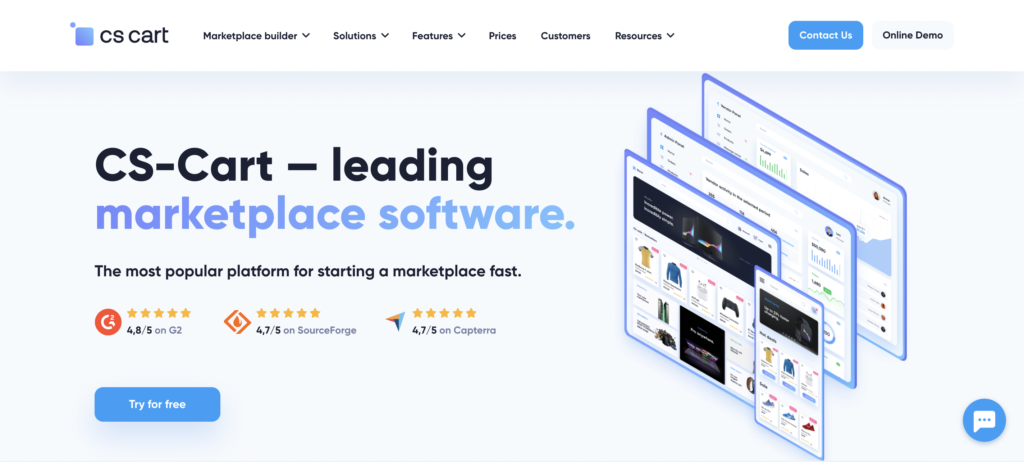
Jungleworks
Jungleworks offers white label solutions for businesses seeking to establish on-demand service marketplaces. Their platform powers brands like Jugnoo, taking care of the technology while businesses focus on growth. This is especially advantageous for businesses with specific content management system requirements in their development process.
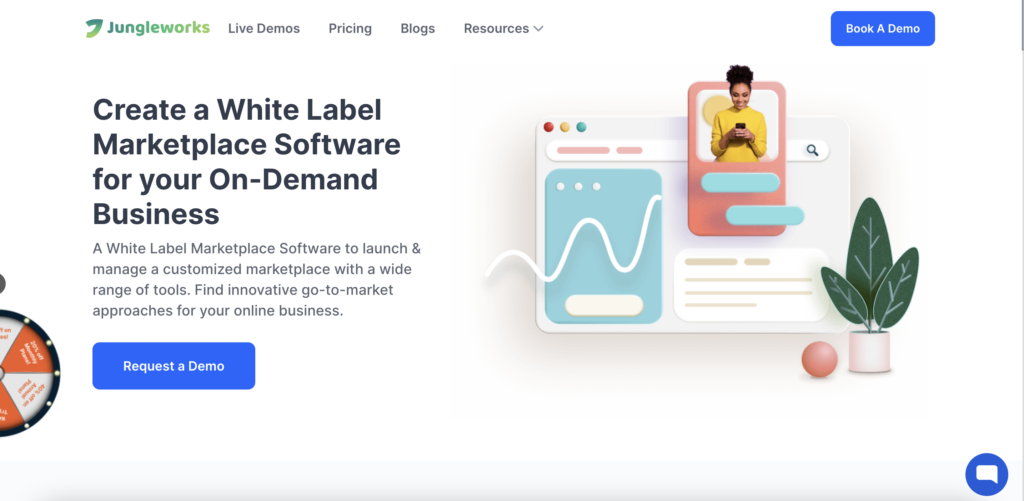
Vendasta
Vendasta provides white label marketing and sales platforms. It’s a comprehensive solution for agencies and businesses to offer a suite of marketing services, helping clients grow their online presence effectively. This white label solution is ideal for businesses looking to expand their revenue streams and sell digital products.
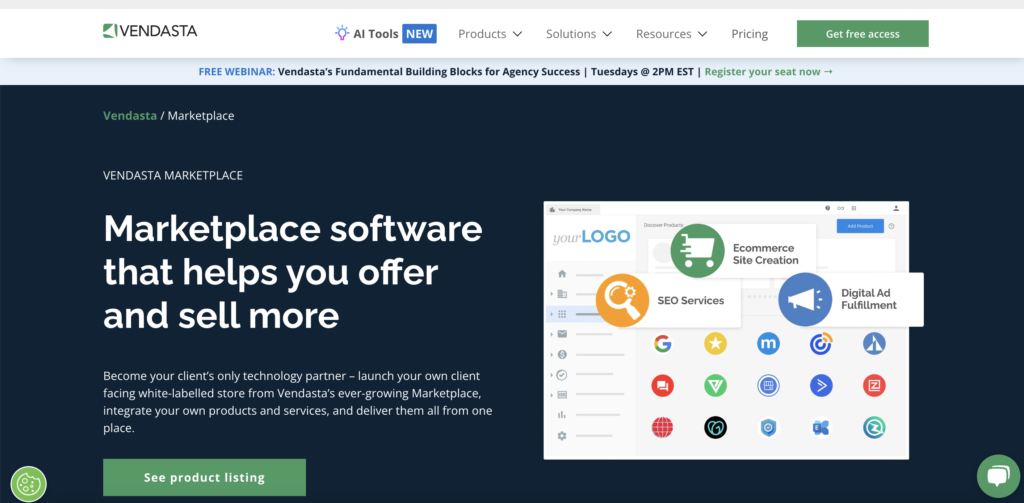
Orbitera (Google Cloud)
Orbitera (joined Google Cloud Platform) is a cloud commerce platform that provides white label solutions for managing and selling cloud services. It simplifies the delivery of cloud solutions, making it an excellent choice for businesses in the cloud services industry. Businesses can use this solution to efficiently sell digital products and create new revenue streams.
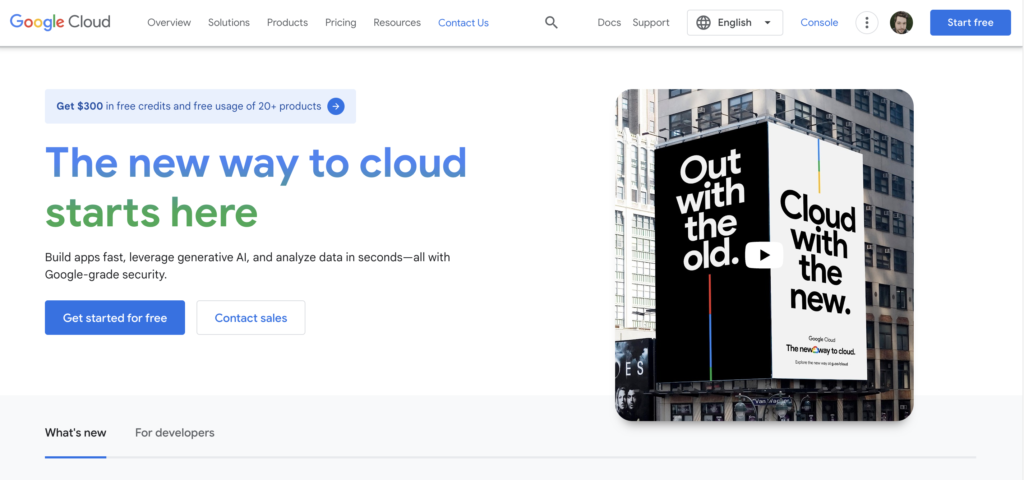
Spryker
Spryker is a modern commerce platform that offers white label solutions for businesses looking to build and expand their online marketplaces. It provides a flexible and scalable framework, making it suitable for various industries and business models. It’s a cost-effective choice for businesses with diverse requirements and a wide range of products to sell.
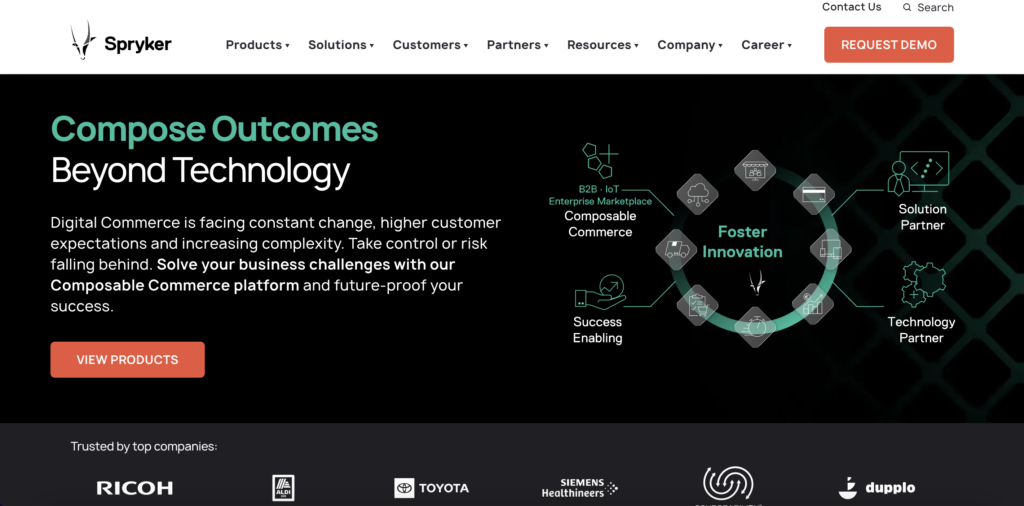
Which to choose for online business: SaaS vs. On-Premises white label marketplace software?
When selecting a marketplace solution for your online store, you have two primary options to consider: a SaaS platform or on-premises solution.
SaaS platform (Software as a Service)
- Simplified Hosting: SaaS platform is hosted on the provider’s servers, allowing you to access it online via your web browser.
- Example: Think of it like using email services such as Gmail. You don’t need to install anything on your computer; you can easily access your email through your browser, saving time and getting your messages to your target market more quickly.
Pros:
- Easy Setup: Setting up your online store is quick and hassle-free, as you don’t have to worry about hosting or dealing with technical aspects.
- Cost-Efficiency: Typically, there are lower upfront costs, as you pay a subscription fee, saving you time and resources.
- Automatic Updates: Regular updates and maintenance are managed by the provider, allowing you to focus on your business requirements.
Cons:
- Limited Control: You have less control over customization and infrastructure, which can impact your ability to tailor the platform to your own branding and unique company requirements.
- Subscription Costs: While initial costs are lower, ongoing subscription costs can add up over time, affecting your selling of digital products.
On-premises white label marketplace software
- Self-Hosting: On-premises software is installed and hosted on your own servers or data centers, giving you full control over technical aspects, including your own branding.
- Example: Imagine setting up a computer server at your office to run your software. You have full control over it, allowing you to cater to your target market with customized solutions.
Pros:
- Full Control: You have complete control over customization, data, and infrastructure, enabling you to meet your business requirements precisely.
- One-Time Purchase: There are no ongoing subscription fees; you purchase the software once, which can be cost-effective in the long run.
- Data Security: Sensitive data can be kept in-house, enhancing your online store’s security.
Cons:
- Higher Initial Costs: There are higher upfront costs for hardware, software, and maintenance, which may require significant resources.
- Maintenance Responsibility: You’re responsible for updates, backups, and security, which can consume more time and effort.
The choice between SaaS and On-Premises white label marketplace software depends on your specific requirements and resources, allowing you to sell digital products and establish your online store according to your own branding.
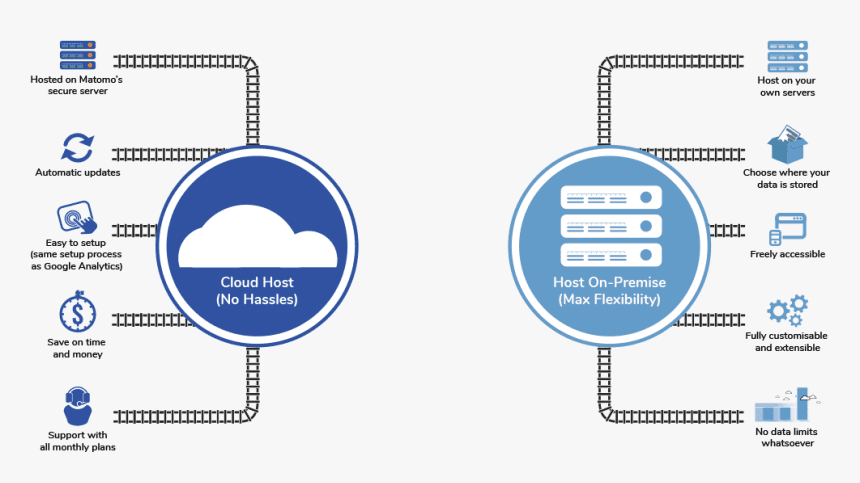
How much does it cost to create a marketplace with white label marketplace software?
Budgeting plays a crucial role in any business venture, and launching a marketplace is no exception. Whether you’re starting a new project or looking to enhance an existing one, understanding the costs involved is essential for wise financial planning.
Save money with an MVP
Creating a Minimum Viable Product (MVP) is a cost-effective way to start your marketplace journey. An MVP is a simplified version of your marketplace that allows you to test your concepts, strategies, and ideas. It’s a lean approach where you build only the essential functionality your marketplace can’t do without. This approach can save you a substantial amount of money, help you market quickly, and it provides a quick way to determine whether your idea is a success or not.
Potential expenses for marketplace launch
1. Marketplace software: The platform on which you’ll build your marketplace is a critical expense. Your options include free solutions like Magento, one-time payment software like CS-Cart Multi-Vendor, or subscription-based platforms like Sharetribe with its Extend plan. This choice allows you to add custom features without extensive coding required, potentially saving on development costs.
Cost: Free / Starting from $1,250 yearly / Starting from $299 monthly
2. Custom modifications: To tailor the software to your business needs, you’ll likely need to customize its functionality, either by modifying existing features or developing new ones. This cost varies based on the complexity of the customization, but it can give you a competitive edge by serving clients better.
Cost: Starting from $500
3. Integration with third-party services: This includes incorporating custom payment and shipping methods and connecting your marketplace with business apps such as CRM and ERP systems. The cost depends on the complexity of the integrations and can enhance customer communications.
Cost: Starting from $700 to $3,500
4. Design creation: Designing a unique storefront look is essential. A designer creates the visual elements, including colors, fonts, and design elements, allowing you to start selling your products with a market-fast approach.
Cost: Starting from $5,000 for the entire marketplace. You can save costs by using a ready-made design theme and tweaking its looks—it will cost you from $1,000.
5. Design integration: Once your design is ready, it needs to be integrated into your marketplace. An experienced front-end developer handles this task, and it’s an essential step in the development process.
Cost: Starting from $10,000 for the entire marketplace
6. Hosting: Hosting is an obligatory expense for your marketplace. Opt for reputable hosting providers with 24/7 support and excellent user reviews. Even if it is a bit more expensive than others, it’s something you really need to invest in for a competitive edge.
Cost: Starting from $69 monthly
Keep in mind that pricing can vary based on your specific business requirements and the complexity of the features you need. If you’re unsure about your exact needs, working with an eCommerce agency to design and build your project from the ground up can be the most expensive but comprehensive option. This approach can help you serve your clients effectively, get to market quickly, and develop a competitive edge in the marketplace.
FAQ
What is a white label SaaS platform?
A white label SaaS platform is software that’s ready-made for businesses to customize and sell as their own, often with their branding and design. It’s a great idea for creating new revenue streams and quickly entering the market.
How to create a white label marketplace with multiple vendors?
To create a white label marketplace with multiple vendors, you choose a white label marketplace solution, customize it to fit your needs, and invite various vendors to sell their digital products on your platform. This approach can save time, boost sales, and provide an efficient way to serve clients’ businesses.
What is an example of a white label platform?
Examples of white label platforms include CS-Cart Multi-Vendor and Spryker. These platforms allow businesses to create their own branded online marketplaces without building the technology from scratch, making it an excellent choice for entering the sharing economy and exploring new revenue streams.
What is white label marketplace?
A white label marketplace is an online platform that businesses can brand as their own, where multiple vendors can sell their digital products or services. This approach is a great way to generate more sales and provide key features for clients’ businesses.
What are the white label platform providers?
White label software providers include companies like CS-Cart, Sharetribe, and Spryker that offer customizable solutions for businesses to create their own branded online marketplaces. These solutions enable businesses to serve their clients effectively and tap into new revenue streams.
Yan Anderson is the Head of Content Marketing at CS-Cart with over 10 years of experience in the eCommerce industry. He's passionate about explaining complicated things in simple terms. Yan has expertise in building, running and growing eCommerce marketplaces. He loves to educate people about best practices, new technologies, and trends in the global eCommerce industry.
